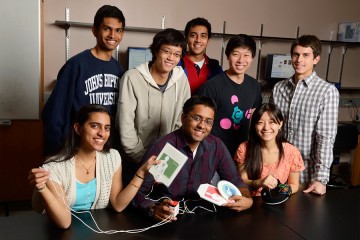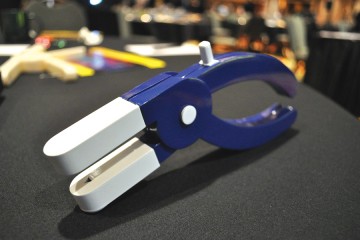Two teams from Johns Hopkins University have been named finalists in the 2015 Collegiate Inventors Competition, which will take place next month.
The undergraduate team includes biomedical engineering students Malvi Hemani, Melissa Lin, Kunal Patel, and Huilei Wang. The team invented TocoTrack, a low-cost uterine contraction monitor. The device, designed to assist midwives in diagnosing labor complications, measures muscle stiffness and can filter out other movements, such as the patient's breathing.
The team plans to partner with NGOs to distribute the device, and 10 test TocoTracks have already been sent to hospitals in India, according to a profile of the team in Forbes Magazine.
The group is advised by Robert Allen of JHU's Department of Biomedical Engineering. The work is conducted within the Center for Bioengineering Innovation and Design, part of the Department of Biomedical Engineering.
The Johns Hopkins graduate student team selected as a finalist includes electrical engineering PhD candidate Dimitra Emmanouilidou and graduate student Ian McLane, who invented a noise-canceling stethoscope. The device records lung sounds with six microphones, and an external microphone records environmental sounds so they can be removed from the analysis, making the device ideal for noisy emergency rooms and ambulances. The team is advised by James West of the Department of Electrical and Computer Engineering.
The Collegiate Inventors Competition, a program of the National Inventors Hall of Fame and Invent Now, is a national competition that recognizes and rewards innovations, discoveries, and research by students and their faculty advisers. Seven teams are selected as finalists in each category.
The 2015 finalists will present their inventions before a panel of judges at the Collegiate Inventors Competition Expo and Awards at the United States Patent and Trademark Office on Nov. 17.
Teams representing Johns Hopkins have earned top placements in the competition in the past three years:
- In 2014, an undergraduate team won second place for AccuSpine, a device for detecting the accurate placement of surgical screws in spinal fusion.
- In 2013, an undergraduate team took home first place for the invention of the PrestoPatch, a system used in treatment of cardiac arrhythmia.
- Also in 2013, graduate student Isaac Kinde won third place for developing technology for the detection of ovarian and endometrial cancers.
- In 2012, an undergraduate team claimed first place for the invention of FastStitch, a device to improve stitches in abdominal surgery.
Posted in Science+Technology
Tagged biomedical engineering, electrical engineering, entrepreneurship












